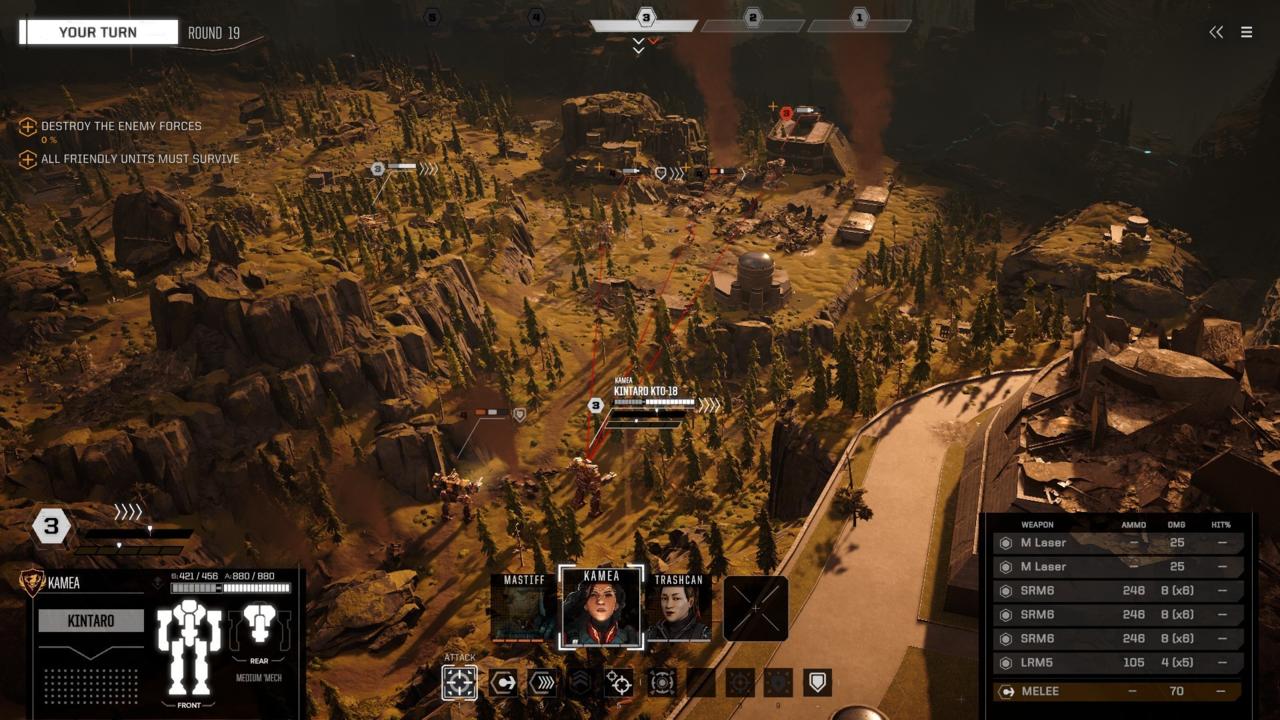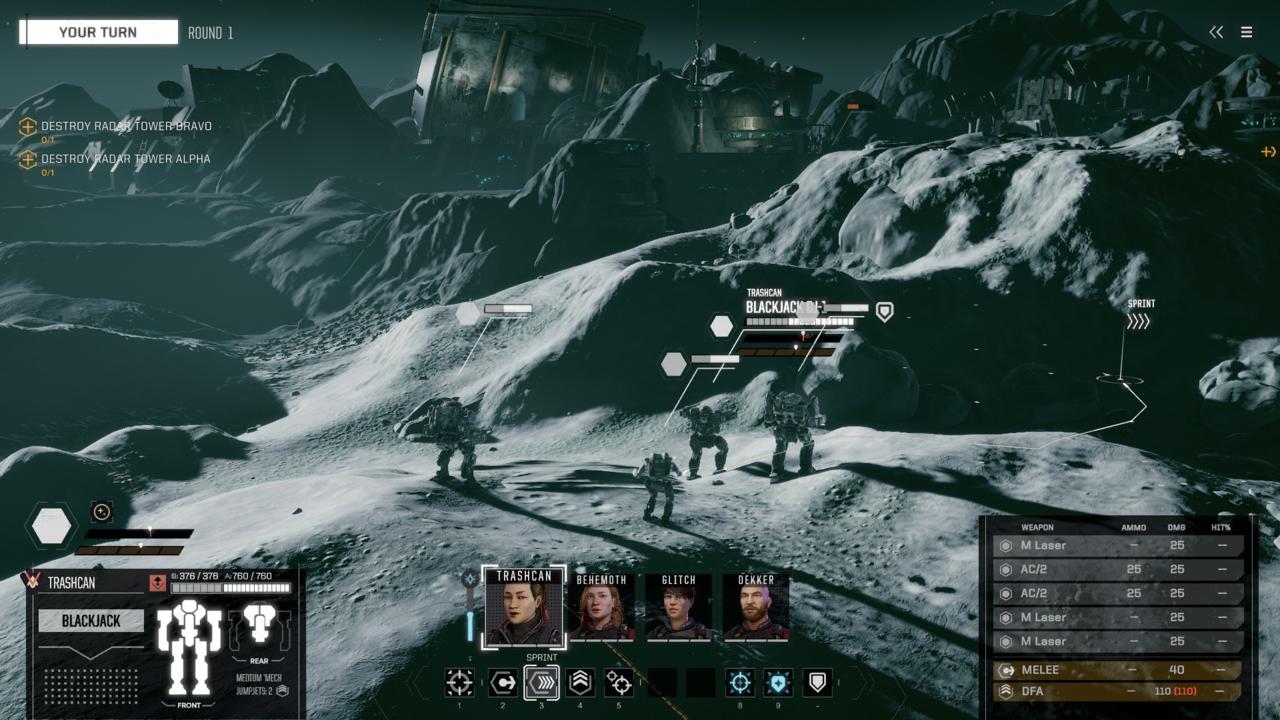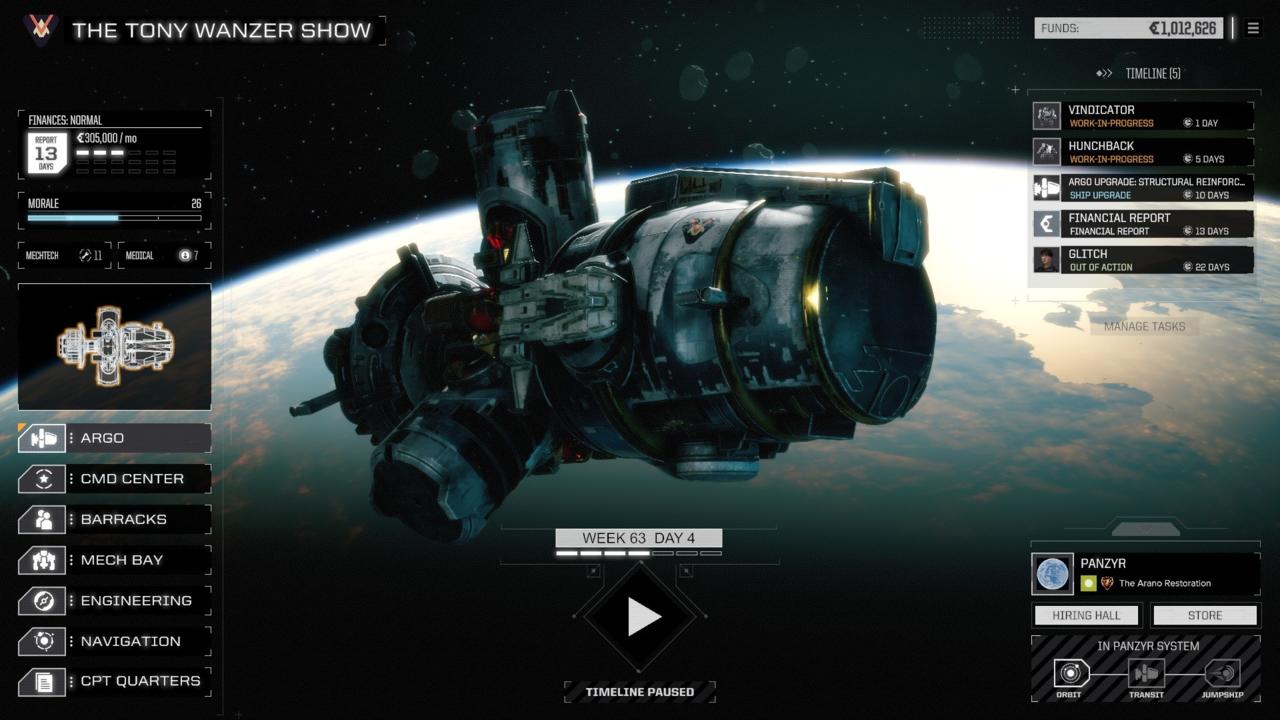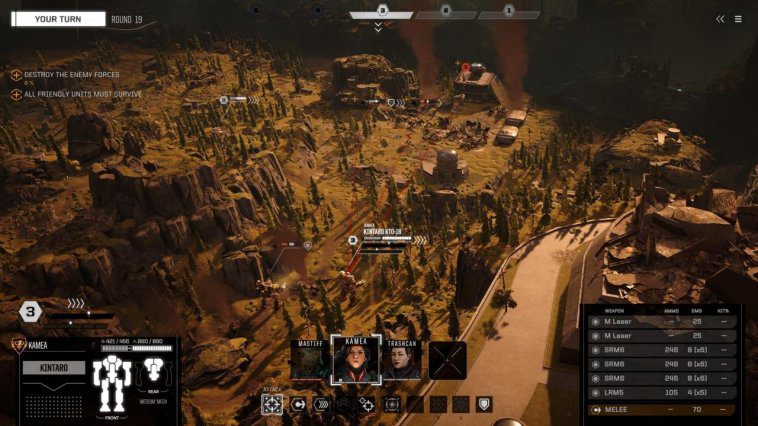Enjoying Battletech takes time and patience. Born from the decades-old tabletop game of the same name (which also gave birth to the Mechwarrior series of games), the Harebrained Schemes version of Battletech places the universe into the genre most suitable to its origin: turn-based tactical strategy. It’s a successful endeavor in that playing Battletech very much feels like playing a complex board game, both for better and worse. There are deep systems to be found in its meaningful mech customization, detailed combat scenarios, and enjoyable fantasy of running an interplanetary mercenary outfit. But reaching the point of thoroughly enjoying Battletech requires the willingness to weather its steep learning curve and laborious pace, which can sometimes veer into excruciating territory.
Individual missions in Battletech are protracted, plodding conflicts, averaging around 45 minutes in length. You command a group of four battlemechs, each piloted by unique and specialized pilots, with the goal of either blowing something up or keeping something safe against outnumbering forces composed of hostile mechs and vehicles of warfare. The enormous mechs of this universe are the lumbering, industrial behemoth kind, bulky tanks with legs characterized by ugly chassis and weapons overtly fused to their limbs. They are graceless, unwieldy machines, and Battletech doesn’t hesitate in belaboring their nature as they slowly trudge through the game’s vast, sprawling maps like pieces on a military sand table.











Observing a unit’s actions play out can be a quite a process. You’ll watch them steadily stomp to a point on the topological grid-based terrain, leisurely rotate their torsos to their designated angle, wait for their weapons to spin up, watch the weapons fire, and wait again for a few moments as the damage report comes in to assess the aftermath. Mech animation speed aside, there are often pauses during this string of actions that feel unnecessarily egregious, and given the number of turns that need to be played out, long missions have the capacity to feel never-ending. There are more exasperating examples, too–during escort missions you’ll find yourself watching up to four autonomous convoy vehicles taking turns to crawl through the map, slowly and one at a time, and the display is nothing short of agonizing. At the time of writing, there is a debug mode you can use to help artificially alter speed, but these are not officially endorsed options. By default, Battletech debilitating pace, combined with the game’s lacking tutorials, firm difficulty, complicated UI, and persistent technical stammers mean the experience of Battletech’s early hours can be tough to brave.
But it’s worth it. Growing acclimated to Battletech’s attrition-focused warfare and making enough of your own critical mistakes to get a handle on its systems feels liberating, when it eventually happens. Being able to parse initially obtuse information allows you to internalize and appreciate the suite of mechanical nuances and helps you recognize the game’s detailed and hard-nosed approach to strategy. Like any great tactical game, each decision requires multi-faceted risk analysis for the best possible outcome. But the joy of good choices in Battletech doesn’t come from bombastic maneuvers where your team precisely eliminates a whole enemy squad without a scratch, as it might in XCOM or Into the Breach–that’s an impossible scenario here. Being truly successful in Battletech relies on being prepared to get into scrappy, aggressive fighting, and coming to terms with what an acceptable loss might be to you at the time, whether that’s an objective, a limb, or the lives of multiple pilots.
With only four mechs to eliminate a larger number of adversaries in a turn-based ruleset, with no allowances for mid-combat repair, learning how to maneuver your mechs in order to endure a reasonable amount of damage becomes one of the most gripping aspects of decision making–how far do you push yourself to take on enormous odds? On the battlefield, this might mean something as simple as studying the impressively varied terrain in each map and finding the most advantageous spot to hunker down, or using buildings, forests, and mountains as cover during an advance. But on a more advanced and necessarily specific level, it might mean rotating your mech to present a fully-armored side to an attacking foe and obscure a side already damaged. Taking additional damage to a body part stripped of armor can result in structural damage or loss of limb, requiring replacement and repairs at significant cost, on top of running an increased risk of having your mech pilot permanently killed.
Similar considerations are always on your mind when you’re on the offensive. You might decide to temporarily switch off some of your weapons when attacking to avoid overheating your mech, which can cause immediate, all-over internal damage. One of your mechs might be out of ammo but has the option of using its jets to leap off a mountain and crash onto an enemy below to knock it down–but can you afford the risk of breaking both your legs and being floored yourself?











With a complete understanding of how each unit can affect another at different locations, with various skills, weapons, and modifiers at play, your perception of unfolding battles becomes one of utter fascination at the minor details and outcomes of each strike. Seeing the battlefield in a different way in order to devise your own alternative approaches and formulating creative backup plans are things that begin to occupy your thoughts, instead of the tempo. Conflicts are still lengthy, and some drawn-out maneuvers still feel unnecessary, but with the time devoted to each turn, you start to use it to observe and internalize what exactly is happening and why. Pivotal turning points in a battle can be narrowed down to the exact action, which can become tactical learnings for future use. There are still a few random elements that can occur, attributed to the probabilities that drive attack calculations–lucky headshots that instantly injure your pilot regardless of armor durability are the prime unfair example–but regardless, the increased focus and time spent on each distinct action means that the anxious feelings that come with even the most trivial of anticipated hits and misses are amplified tenfold.
Battletech also gives you an interesting ability used to preserve your squad–when a mission becomes overwhelming and dead pilots are almost certain, you can choose to immediately withdraw from a mission, at the cost of sullying your reputation with the factions that hired you and surrendering your paycheck. The latter is an especially vital consideration, because money quickly becomes a huge concern in Battletech’s campaign and begins to affect all your decisions, both on and off the battlefield.

The dynamic between the tactical battles and logistical management means almost every decision you make feels like it has rippling, tangible consequences elsewhere. The campaign sees your custom character rise to the leadership of a mercenary company which has accrued an enormous debt, with monthly repayments to meet every month. Naturally, everything costs money, from post-mission repairs, mech upkeep, pilot salaries, ship upgrades and even travel costs–this is a game about business management as much as it is about commanding a squad. Accepting missions allows you to negotiate a contract to determine what your fee should be in relation to your post-battle salvage rights (valuable for maintaining and upgrading your mech configurations as well as unlocking new models) and faction reputation, which opens up more lucrative opportunities. Request too little money on a mission you take carelessly, and the cost of mission-ready repairs afterward might send you into bankruptcy. Without enough salvage and spare cash to play around with, you’re impeded in your ability to play with one of the most vital and enjoyable parts of Battletech: building and customizing individual mechs to improve the combat capabilities of your squad.
There are close to 40 different models of stock mechs, varying in tonnage and intended purposes. But the joy of spending time in the mech bay is experimenting with different configurations using the parts you have on hand. Every alteration you make on a mech is at the sacrifice of something else–you can carry more weapons and ammo at the expense of dropping things like heatsinks and additional armor plating, for example. Taking the time to fine-tune that balance and seeing your decisions translate into a more efficient unit on the battlefield feels exceptionally worthwhile.










The lore and epic narratives of the Battletech universe are as important as the mechs themselves, and this game puts a heavy emphasis on them. The main plot begins with the coup of the head of a parliamentary monarchy–your custom character’s childhood friend–and continues as you regroup years later to rally forces and take back the throne. The recorded details of the fictional history and politics between factions are unsurprisingly scrupulous–glossary tooltips for universe-specific concepts litter the game’s text. But there are enough broad strokes and familiar feudal parallels to enjoy it at face value, and the comprehensive presentation–well-written and diverse characters, beautiful 2D cutscenes, inspired soundtrack, crunchy sound design and convincing radio chatter–do more than enough to completely sell this brand of mecha fantasy.
Battletech is a game that selfishly takes its time to be meticulous in every respect, and pushing through the density and idiosyncrasies of its many, slow-moving parts can be tough. But if you have the will to decipher it, albeit, at a deliberate and punishingly plodding pace, you can find yourself completely engrossed in its kinetic clashes. Battletech’s intricate components ultimately foster a fascinating wealth of nuanced systems that build a uniquely strenuous, detailed, and thoroughly rewarding tactical strategy game.
Website: LINK


